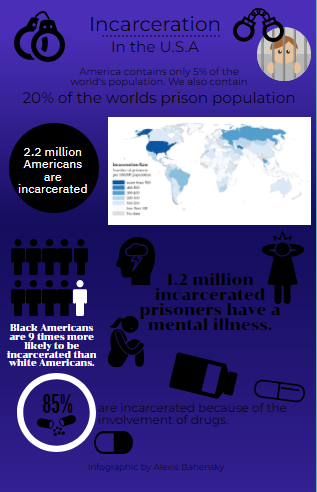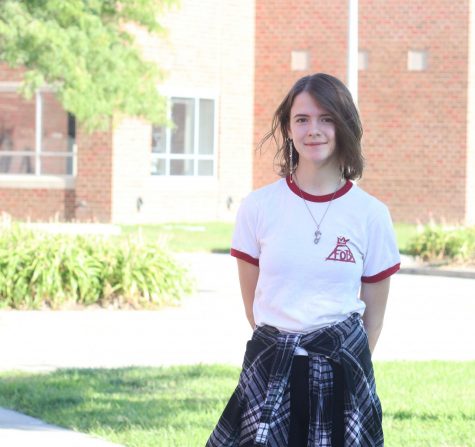Unjust imprisonment
Mass incarceration only does harm

Infographic by Alexis Bahensky
Incarceration rates have skyrocketed in the United States. We have the highest population of prisoners in the world, while only holding less than 5% of the world’s population.
February 7, 2022
Recently, Nebraska has put forth a plan to build a new prison in the eastern part of the state. While corrections director Scott Frakes stated that the new prison won’t be created to hold more prisoners, America’s current incarceration rates state otherwise. While the intentions of the new building are said to bring a more positive outlook on the prison system, this won’t solve the day-to-day problems inmates face.
America contains only 5% of the world’s population, yet we also have more than 20% of the world’s prison population. So this isn’t just a problem with incarceration itself, but rather America’s approach to the matter. If we want to use prisons for their intended purposes (rehabilitation and safety measures), then we can’t just sit by and watch our country continue to imprison citizens unjustly.
Incarceration rates have increased 500% since 1970. That’s thousands of people being wrongly accused, receiving punishments not fitted to the crime committed and being discriminated against. In Nebraska, 601 in 100,000 people are incarcerated which is only 63 below the national average of 664; however, it is also 472 people higher than the second leading country in incarceration rates: the United Kingdom. If this doesn’t show how much of a problem this is in America, nothing will.
One of the biggest concerns with incarceration involves race. Since 2020, there have been mass debates over-policing and the color of one’s skin. Certain movements such as Black Lives Matter and others brought light to how people of different races are treated when it comes to the criminal justice system. According to The Sentencing Project, compared to Latino and white American rates which involve less than 400 per 100,000 people, Black Americans are incarcerated at a state average of 1,240 per 100,000 people. Nebraska is the 10th leading state with Black Americans being 8.9 times more likely to be incarcerated than white Americans.
The fact that Black Americans are still being wrongly imprisoned today is a call for social justice. One way incarceration rates can be improved for people of color is by decriminalizing low-level drug offenses. Most convictions that happen when an illegal substance is involved and Black Americans, Latinos and other Americans of color are the ones involved, are longer than they should be. This could be due to the involvement of drugs, but racial biases play a huge role nonetheless.
Incarceration over drug use is also a problem all on its own. Eighty-five percent of those incarcerated are there because of the involvement of drugs. Federal charges can give first offense drug possession two – 10 years in prison. For a first offense that is a bit much. A person for only having drugs on their person, especially if it isn’t a large amount, should not receive years in prison. Like California’s policies, a person should face 15 – 180 days in jail. This is all for drug abuse; however, most convictions get the words abuse and use confused leading to harsher punishments that shouldn’t be given out. When someone abuses a drug they are using it in a harmful way which is a danger to others around them which is a valid reason for arrest. However, most have just used a drug rather than abused it, causing no harm to befall on others.
Another population greatly affected by incarceration is those with mental disorders. There are 1.2 million people sitting in prisons across the U.S. with a mental illness. The most common misconception of those with mental disorders is that everyone who has one is a danger to themselves and those around them. America’s homeless population is most affected since many are found to have some sort of mental issue. While this isn’t always true, most of the time, local authorities find it easier to stick them in prisons rather than getting them the help they need. People with mental illnesses are nine times more likely to be put in jail than hospitalized. Rather than throwing the mentally ill in cells, we should be providing them with the services they need to help improve their condition.
Those incarcerated have also shown signs of developing mental disorders. Research has shown that mood disorders such as major depressive disorder and bipolar are connected to incarceration. We can’t let this go on. This should be a sign that incarceration can’t be used to solve every little minor occurrence in our legal system. If it is causing people to develop mental illnesses that are only worsened through that process then things need to be changed.
The way these prisons handle the incarcerated mentally ill is far from humane. When released, patients are given, if they are being treated at the time, a limited amount of medication that usually lasts them up to several weeks. While this is a helpful short-term solution, those people usually end up right back in the same cell because they run out of medication. It is a nonstop cycle for those who are mentally ill, being in and out of prison, because those facilities don’t promote proper mental care, leading to the incarceration of these people.
Different facilities also cause these problems. Most collect money based on the number of prisoners they hold, especially privately owned prisons. This gives these facilities an incentive to continue to incarcerate more people because that means they gain more income. While the number of privately owned prisons has lowered, they are still a major obstacle to solving the problem of incarceration. Even President Joe Biden has issued a plan to stop the U.S. Department of Justice from renewing the licenses of these prisons.
Incarceration is not a solution, it’s the problem. Too many innocent people are being convicted and sentenced to harsh punishments because America isn’t willing to reevaluate how our justice system functions. We won’t be able to claim the value of freedom until this wrong is corrected and those incarcerated are treated humanely.






